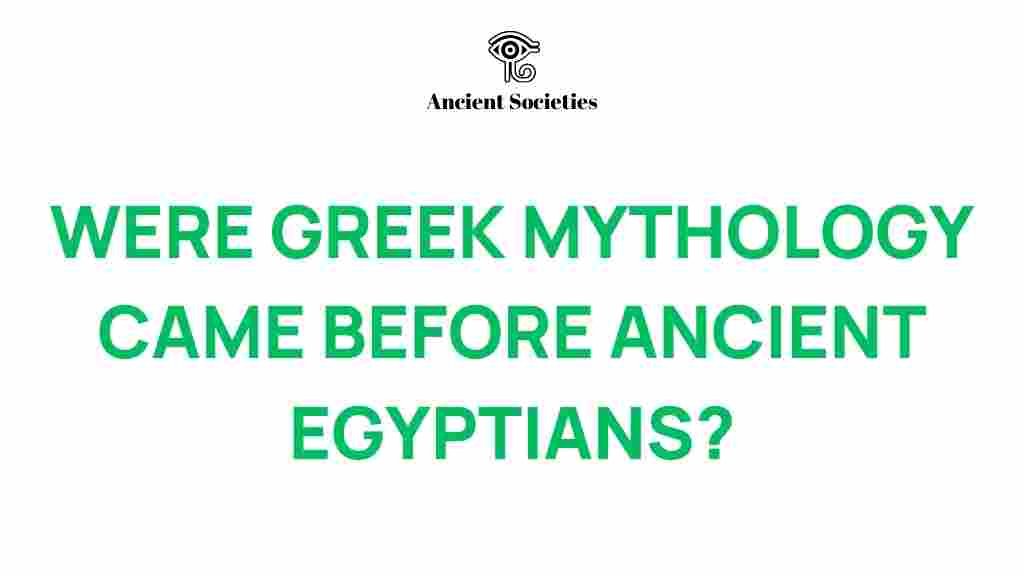Unraveling the Origins: Did Greek Mythology Precede Ancient Egypt?
Greek mythology and Ancient Egypt are two of the most fascinating ancient civilizations, each rich with their own unique cultural narratives and deities. The comparison of these mythologies has intrigued historians, archaeologists, and enthusiasts alike. But one question stands out: Did Greek mythology precede Ancient Egypt, or did they evolve concurrently? This article delves into the origins of both mythologies, examining their development, cultural exchanges, and historical influences.
The Foundations of Greek Mythology
Greek mythology is a collection of myths and legends that were integral to the religious and cultural life of ancient Greece. It encompasses a variety of stories about gods, goddesses, heroes, and the nature of the universe. The origins of Greek mythology can be traced back to the following:
- Early Oral Traditions: Greek myths were initially passed down through oral storytelling, with significant contributions from poets like Homer and Hesiod.
- Influence from Minoan and Mycenaean Cultures: Elements of Greek mythology can be linked to the earlier Minoan and Mycenaean civilizations, which thrived in the Aegean region.
- Syncretism: As Greek culture evolved, it absorbed various influences from neighboring cultures, including those from the Near East.
The Historical Context of Ancient Egypt
Ancient Egypt boasts one of the longest-lasting and most influential civilizations in history. Its mythology was deeply intertwined with daily life, politics, and religion. Key aspects of Ancient Egyptian mythology include:
- Creation Myths: Egyptians had several creation myths, including those centered around the god Atum and the concept of Ma’at, which represented truth and cosmic order.
- The Pantheon of Gods: The Egyptian pantheon included numerous deities such as Osiris, Isis, and Ra, each embodying various aspects of life and the afterlife.
- Funerary Practices: Myths surrounding death and rebirth were crucial, influencing practices such as mummification and the building of elaborate tombs.
Comparing the Evolution of Greek Mythology and Ancient Egypt
While both mythologies are distinct, they share common themes, such as creation, the afterlife, and the relationship between gods and humans. Let’s explore how these mythologies evolved:
- Cosmology: Both cultures developed unique cosmologies. Greek mythology often depicted a chaotic universe ordered by the Olympian gods, while Ancient Egypt emphasized balance and harmony through Ma’at.
- Heroic Narratives: Heroes like Heracles in Greek mythology have parallels in Egyptian mythology, where figures like Horus are celebrated for their heroic deeds.
- Symbolism and Art: Artistic expressions in both cultures reflect their mythologies, with Greeks favoring pottery and sculptures, while Egyptians utilized hieroglyphs and monumental architecture.
Cultural Exchange and Historical Influence
The potential for cultural exchange between Greek and Egyptian civilizations raises intriguing questions about their origins. Here are some points to consider:
- Trade Routes: Trade between Greece and Egypt facilitated the exchange of ideas, art, and religious practices.
- Hellenistic Influence: After Alexander the Great’s conquest, Greek culture significantly influenced Egypt, leading to a blend of Greek and Egyptian religious practices.
- Literary Interactions: Greek writers, such as Herodotus, documented Egyptian customs and beliefs, further intertwining the two cultures.
Step-by-Step Process of Mythology Evolution
Understanding the evolution of Greek mythology and its relation to Ancient Egypt can be approached through a systematic process:
- Identify Key Myths: Examine foundational myths in both cultures and their significance.
- Analyze Historical Context: Look at the historical timelines of both civilizations to determine periods of interaction.
- Study Artistic Representations: Explore how art from both cultures reflects their respective mythologies.
- Examine Textual Evidence: Investigate ancient texts, inscriptions, and artifacts that reveal beliefs and practices.
- Compare Themes: Highlight similarities and differences in themes such as creation, heroism, and the afterlife.
Troubleshooting Misconceptions
As with any study of ancient civilizations, misconceptions can arise. Here are some common misconceptions and clarifications:
- Misconception: Greek mythology is entirely original and not influenced by previous civilizations.
- Clarification: Greek mythology shows clear influences from Minoan and Mycenaean traditions, as well as interactions with neighboring cultures.
- Misconception: Ancient Egyptian beliefs were static and unchanging.
- Clarification: Egyptian mythology evolved over thousands of years, influenced by political changes and interactions with other cultures.
- Misconception: The gods of both mythologies are not comparable.
- Clarification: Many gods from both traditions serve similar functions, such as overseeing fertility, the afterlife, and justice.
Conclusion: The Interwoven Tapestry of Mythology
The exploration of Greek mythology and Ancient Egypt reveals a complex web of cultural exchange and historical influence. While both mythologies developed independently, they also shared common themes and narratives that highlight the interconnectedness of ancient civilizations. Understanding the origins of these mythologies requires examining their evolution, the influences they absorbed, and the ways they impacted each other over time.
In summary, while Greek mythology may not have preceded Ancient Egypt in a straightforward manner, the two have undeniably influenced one another throughout history. As we continue to unravel the origins of these mythologies, we gain insights not only into the past but also into the foundations of modern storytelling and belief systems.
For further reading on the fascinating connections between ancient civilizations, check out this comprehensive resource. To explore more about Greek mythology, visit our mythology section.
This article is in the category Culture and created by AncientSocieties Team
